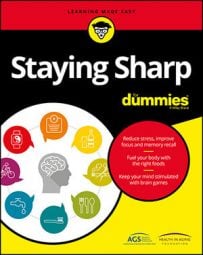People have busy lives, and sometimes some things like shopping lists or where you're supposed to go get pushed to the back of your mind.
Don't worry too much about this kind of thing. The problem arises when it happens all the time rather than just occasionally. If you're regularly forgetful in this way, here are some helpful tips.
Repeat, repeat, repeat
People sometimes forget that repetition can be a powerful tool to move something into their long-term memory (which is the permanent memory). But there's a knack to using repetition.Here are a few guidelines:
- Repeat only for a short time. You don't need to spend hours repeating something, such as a topic you want to remember. In fact, if you spend too long doing that, you'll overtire yourself. Instead, spend just a few minutes mentally going over what you want to remember.
- Repeat what you want to remember periodically. You don't have to do this at a set time every day — in fact, it's better if you do it at different times. For example, while you're brushing your teeth, go over what you want to remember. The next day, do it while you're getting dressed. When you repeat information at varying times, you tell your brain that this information is important, and it creates a strong connection in your long-term brain stores so you'll remember it for a long time.
- When you repeat information, don't forget to say the list from the beginning. Often you may only repeat things at the end of your list or even out of order. This approach isn't a good way to train your memory, and you'll end up forgetting things more often than not. Train yourself to consistently repeat things in the order you hear them and from the beginning of the list, and you'll notice a big difference.
Rhyme to remember, and other helpful strategies
Your brain stores information by using different clues. One clue uses phonological information — the way the word sounds. Your brain makes a connection between words that sound the same and remembers these words when you're trying to think of another word.Phonological links can explain why when you're trying to say "pear," all you can think about is "bear," or why you think someone's name is Diane when it's actually Donna. The fact that your brain makes a connection between words that sound similar makes rhyming words such a great trigger for remembering things.
Another clue your brain uses is semantic information — factual information about the word, such as the category it belongs to and its purpose. Think of your long-term memory as a big library. Your filing system groups words into categories, such as names of fruit, furniture, or animals. Then it divides each category into more-specific categories, such as pets, wild animals, animals that fly, and animals that swim.
Many great tips can help you remember information when you don't have a paper and pencil in hand. One is to try to create an association and to link it with another word. Choosing rhyming words is a good technique because your brain remembers words that sound similar. If you put them to music, the words become even more memorable. For example, if you have a doctor's appointment, you can make up a rhyme like "See Dr. Brown when I go to town." The rhymes that you make up can even be silly or nonsensical; that just helps the words be more memorable (think of the works of Lewis Carroll).
Another tip is to remember words in categories. If you're trying to remember your shopping list, think of all the items you can find in the dairy aisle, the vegetables in the produce section, and the breads in the bakery. If you have a meeting and you need to remember several key points, organize them in categories. This helps you to remember more information than if you just kept a running tab of all your ideas for the meeting in your head.Don't forget to repeat the information to yourself. Just coming up with a rhyme or an organization style isn't enough to ensure that you remember. You need to repeat the information a few times to yourself to make sure the connection is strong. If you have something important that you need to remember in the morning, repeat it to yourself several times before you fall asleep. It will almost always be the first thing you think of when you wake up in the morning. Try it to see for yourself!

